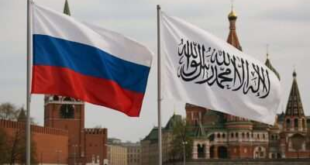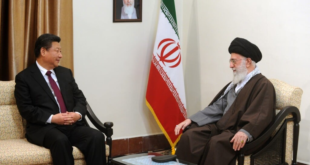The Afghanistan government’s top peace negotiator has voiced concern that the withdrawal of NATO forces from Afghanistan could cause a “security vacuum, an increased level of fighting and perhaps a slower pace of negotiations,” saying the solution “has to be through negotiations, not through battle.”
“The Taliban has unfortunately increased its activities,” thinking that “it might help them at the negotiation table later on,” Abdullah Abdullah, the chairman of Afghanistan’s High Council for National Reconciliation, told Nikkei Asia on the sidelines of this past weekend’s international diplomacy forum in the Turkish resort city of Antalya. Abdullah described this thinking as “a mistake.”
Abdullah’s remarks come ahead of his visit to the White House on Friday this week with Afghan President Ashraf Ghani. Their trip “will highlight the enduring partnership between the United States and Afghanistan as the military drawdown continues,” White House spokesperson Jen Psaki said in a statement issued Sunday.
NATO forces will leave Afghanistan in coordination with the American pullout slated to wrap up by Sept. 11, closing the book on nearly two decades of deployment after coalition forces ended the Taliban’s rule after the 9/11 attacks on the U.S. in 2001. The NATO deployment numbered around 10,000, including 2,500 American troops, according to a U.S. Department of Defense news report in April — down from a NATO-wide total of more than 100,000 in 2011. The U.S. Central Command announced in early June that it had completed more than 50% of the “retrograde process.”
Abdullah said some factions within the Taliban could seek to stall negotiations in hopes that “there might be military solution, which is not the case, as there is no military solution.”
NATO forces “have helped Afghanistan for 20 years in many ways, making sacrifices,” Abdullah said. “And now there is a new phase” where “U.S. and [NATO] member states will support in a different way, such as helping with security and military institutions and with the civilian setup for the development of Afghanistan,” he said.
This year’s Antalya Diplomacy Forum, held between Friday and Sunday, became a venue for Afghanistan’s neighbors, regional actors and mediators, including ministers from Turkey, Iran, Pakistan and Qatar, to discuss what comes after the NATO pullout.
Wary of leaving a security vacuum, the U.S. wants Muslim-majority Turkey, NATO’s second-largest army, to continue to provide security at Hamid Karzai International Airport after the NATO pullout. The U.S. is also encouraging Turkey to play a role in peace talks between the Afghan government and the Taliban by holding a high-level peace summit, complementing Qatari mediation efforts.
Turkish President Recep Tayyip Erdogan said after meeting with U.S. President Joe Biden on the sidelines of the NATO summit in Brussels this month that Turkey is open to such a task. He suggested enlisting the help of Pakistan, which has clout with the Taliban that can reduce the risk of a confrontation. At the same time, Erdogan said that “it is not possible to ignore the fact of the Taliban.”
Rich Outzen, a former U.S. military officer and State Department policy planner who served as a military attache at the American Embassy in Kabul, told Nikkei Asia: “If Turkey and Pakistan agree to join hands, they can significantly contribute to the stability of Afghanistan and can secure the airport together, as Pakistan has influence over Taliban.”
U.S. national security adviser Jake Sullivan told reporters this past Thursday that the two leaders had agreed that Turkey would play a leading role in securing the Kabul airport, and that Biden “committed” to certain forms of U.S. support that Erdogan has sought to make this happen.
Taliban spokesman Suhail Shaheen told Reuters on June 10: “Turkey was part of NATO forces in the past 20 years, so as such, they should withdraw from Afghanistan on the basis of the agreement we signed with U.S. on 29th Feb. 2020.”
“Otherwise, Turkey is a great Islamic country. Afghanistan has had historical relations with it. We hope to have close and good relations with them as a new Islamic government is established in the country in future,” the spokesman said.
Sullivan said that “we do not believe that what the Taliban has said publicly should or will deter the efforts underway right now to establish that security presence.”
Asked about the fate of postponed Afghanistan-Taliban high-level talks in Istanbul, Abdullah said: “The Taliban refused to participate, but have not said no.” He said the Taliban put forward unreasonable conditions.
Abdullah said details need “to be discussed between with the government of Afghanistan and relevant authorities, but I personally have an absolutely favorable view in support of the Turkish role at the airport.”
Turkish troops have been in Afghanistan for nearly two decades for strictly noncombat missions, such as training Afghan forces, building local infrastructure and securing airport facilities. Turkey enjoys support from local Uzbek and Tajik populations, which share common Turkic roots.
The U.S. withdrawal gives Erdogan a rare tool for leverage to seek better relations with the Biden administration. Hamid Karzai International Airport is a key gateway into landlocked Afghanistan, where foreign embassies and aid organizations depend on the airport’s security to continue their activities.
Metin Gurcan, an independent Turkish security analyst who previously served as a military adviser in Afghanistan, cautions that any premature military involvement without prior coordination with the Taliban could result in clashes and jeopardize Turkish troops and the clean image of Turkey within Afghanistan.
“If a security threat level of Syria’s Idlib is 1 and Libya is 10, then Afghanistan is a thousand,” Gurcan warned, comparing Afghanistan with other military theaters where Turkey is engaged.
 Eurasia Press & News
Eurasia Press & News




